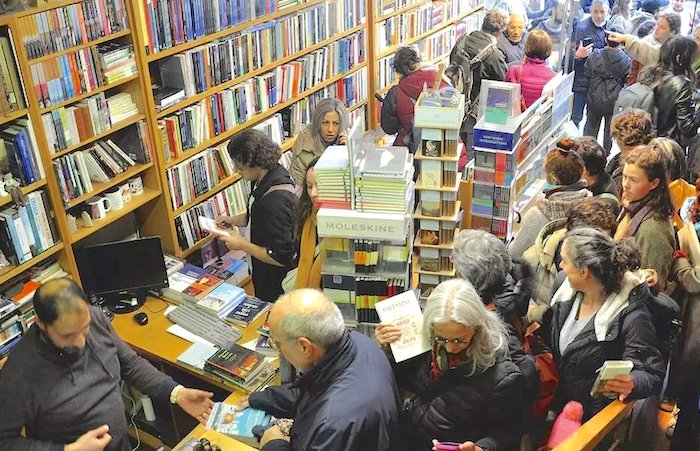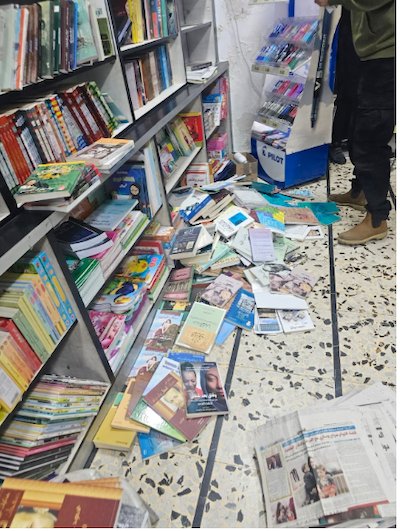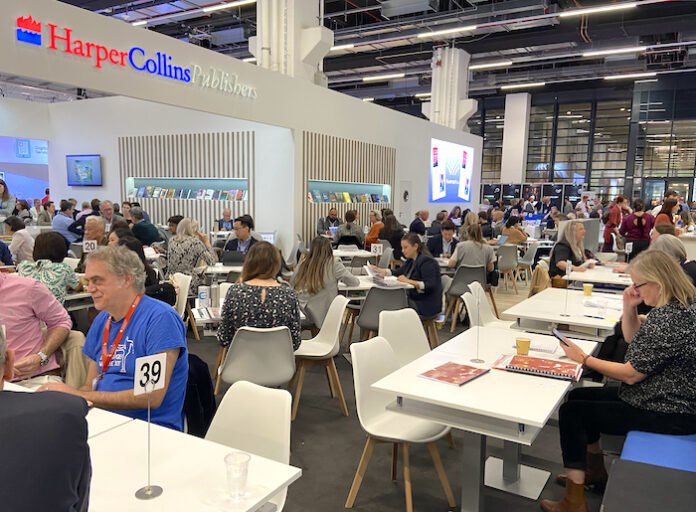If we look at the statistics first, the five days of this year’s Frankfurt Book Fair have been attended by 238,000 visitors, of whom about half were trade visitors – i.e., more or less the same presence as in previous years. With 4,350 booths, exhibitor numbers appear to have settled down as well. Whereas these compare to the 7,000 and more in pre-pandemic times, visitor numbers seem to slowly catch up with the fair’s glory days, owing to the organizers’ diversification efforts.
The book industries from Asia-Pacific occupied more than ten percent of the booths, 472 in total (from 460 last year), including 186 from China and Hong Kong, 60 from India, 48 from South Korea, 37 and a large collective stand from this year’s Guest of Honour the Philippines, 30 from Singapore, 27 from Australia, 21 from Thailand, 20 from Taiwan, 20 from Japan, 12 from New Zealand, and a handful from Malaysia, Indonesia, Vietnam, Pakistan and Bangladesh.
The exhibitors from India included 34 publishers and distributors, 13 software companies, 9 printing houses, literary agency Red Ink, and three collective stands of industry organizations NBT, Capexil and the Chennai International Book Fair representing another few dozen publishing houses.
At the fair’s opening press conference, FBF Director Jürgen Boos stated, “We are opening this fair in a very polarized time, a time when clear messages and commitments are required, when literature is under pressure because of wars, censorship, book bans, and counterculture. Even in Western democracies, there are culture wars which have direct impact on publishing. Libraries remove whole genres from their shelves. Grants are being filtered politically, the freedom of science and publication comes under threat. That’s why we have created our culture-policy program, Frankfurt Calling, not because it’s nice, but because it’s necessary – because there must be places where authors are heard, authors who are otherwise silenced or banned. This is the focal point of voices who rarely share a stage.”


Effectively, at the Frankfurt Calling stage, Palestinian bookseller and writer Mahmoud Muna had the opportunity to share his experiences during a discussion on “Selling Books in Times of War”. His Educational Bookshop in Jerusalem, founded by his father more than 40 years ago, covers a wide range of topics, from Palestinian history and politics to literature and social sciences. This February, Israeli police raided the shop twice, confiscating books such as Noam Chomsky’s Gaza in Crisis. Muna and his nephew were arrested and detained for two days on charges of selling books that would incite terrorism. In another session at the Frankfurt Calling stage, Muna presented an anthology he co-edited, Daybreak in Gaza: Stories of Palestinian Lives and Culture.
Many of the other debates at the fair centered around the use of artificial intelligence in publishing, translation and distribution. But, as Boos also said, “debates alone do not make a big book fair,” adding that “to make these voices resonate, the Frankfurt Book Fair is also required as a trading platform for the exchange of rights and licenses for translation work and editing. At many points, such rights-trading activities embrace the migration of content to television series, films, radio plays, and games. The program this year includes what is perhaps its most aggressive efforts yet in the ‘book-to-screen’ sector.”
The 600 tables at the Literary Agents & Scouts Centre (LitAg) and the Publishers Rights Centre were sold out, occupied by 321 agencies from 32 countries. Notable book deals hitting the headlines included HarperCollins acquiring four titles from the author of Yellowface, RF Kuang. A transatlantic deal for The Cauldron: The Making of the Modern Middle East by historian Simon Sebag Montefiore also caused a stir.
This year’s Book-to-Screen Day featured matchmaking sessions to bring publishers and filmmakers together as well as a master class on film scouting and panel discussions on
book adaptations for films and video games. The other main issues discussed and exhibited in the framework of the fair’s trade program were audiobooks, comics and the so-called ‘New Adult’ publishing category targeting feminist, gender identity and ecology trends. The PublisHer network offered a series of mentoring sessions and on-stage events discussing female empowerment and gender equality in the publishing industry.
A new funding program, the Frankfurt Fellowship Network, offered young book professionals from around the world a series of matchmaking, networking and training sessions with visits to publishing houses and bookshops in Frankfurt and Zurich. The fellows also received a collective stand at the fair.
A coalition of around 500 publishing houses, Publishers for Palestine, had called for a boycott of the Frankfurt Book Fair because of what has largely been perceived as the fair’s biased stance on Israel. The coalition, which also criticized the Bologna Children’s Book Fair for its silence on the war in Gaza, was formed two years ago by all the major leftist and numerous other publishers from the US, Canada, India, Europe, Asia, Africa, Latin America, Australia and the Middle East. However, despite its call for a boycott, several of the coalition’s own members exhibited at this year’s FBF. And apart from a few tiny publishers mainly in the arts segment, no German publishers have been participating in this coalition or any other campaign in support of Palestinian writers and publishers.
Meanwhile, more than 7,000 authors, editors, translators, illustrators, publishers, agents, librarians and other book industry workers joined the ‘Boycott of Israeli literary institutions complicit in the dispossession of the Palestinian people’ in a letter that was circulating at the book fair.
The next Frankfurt Book Fair will be held October 7 to 11, 2026, with a focus on the Czech Republic’s book industry.
FBF Attendance before and after the Covid-19 pandemic. Source: FBF, IppStar www.ippstar.org


















